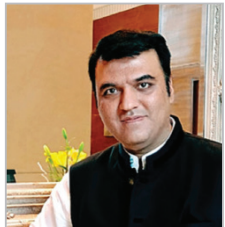Dr.Nitin Nagrale, Founder of HPMF

‘Prioritization of work is the key to success in Procurement’
A pioneer and visionary in the field of procurement, Dr. Nitin Nagrale, shares his experience with Champions of Hospitality.
Dr. Nitin Nagrale, a pioneering procurement veteran has many firsts to his credit. At 26, Nagrale was the youngest Purchase Manager in the Hospitality Industry in India. His recent achievement was selection as Top 25 Procurement Professionals in India, Middle East and Africa. Moreover, he is the first person in the world who have completed Certified Hotel Purchase Manager (CHPM) Certification Course from the American Hotel and Lodging Education Institute.
In 26 years, he built a commendable experience in a challenging field and is widely recognized for his pioneering work in the purchase sector. In spite of him being from Hotel Management School, he chose a different path and made it successful.
He has been acknowledged for his contribution on numerous occasions. Among his many recognizable awards is the APJ Abdul Kalam Lifetime Achievement Award 2018 along with Hall of Fame Award – Outstanding Contribution to the Hospitality Industry 2018 by Trinity, Goa, and Top 50 Innovation Leaders 2018 by BTVI.
The National American University conferred him the Honorary Doctorate in Supply Chain Management. His visionary work led to spearheading the Hospitality Purchasing Managers’ Forum (HPMF), where he is the Founder and General Secretary. As a Purchase head he was instrumental in the launch of several luxury hotels in India and South-East Asia.
The veteran brings a wealth of expertise in the hospitality and food industry purchase department. He’s overseen celebrity weddings of the Ambani, Deepika Padukone, and Ranveer Singh to mention a few. He is seasoned in dealing with last-minute requests. He explains that while most organizations prepare for events and their routine orders, some scenarios throw the purchase manager into a crisis.
He explains, “The last-minute requests occur, when either the product is consumed, or the quantity ordered was less or the last item added was not asked for in the first place. In other cases, the guests make a sudden request at the last mine.”
At such times, the procurement head has to produce the product to the internal team at the earliest. Often they shorten the requisition process by ordering it straight from the vendor. Elaborating the system, he says, “We don’t wait for the usual round of three quotations but look at the competitive price. At these times, the price is flexible since it is an urgent request.”
After identifying the supplier and ensuring the product is available, the manager begins the back-end approval process for order and receives it.
But last-minute purchases shouldn’t compromise on quality. Nagrale maintains that it is imperative to adhere to the highest quality despite price variations. Sometimes, the manager could get a better rate if they have a good relationship with the vendor.
Nagrale emphasizes the need to develop a strong bond with the supplier. Success in today’s world is built on good relationships, apart from subject knowledge. “If the connection with the vendor is strong, they go the extra mile to provide you the order as per the specifications. There is no deviation in quality, and they are more likely to offer a larger credit period.”
He elucidates with an example from the food and beverage category. He says, “It is a challenging category as you have to ensure the right specification of product all the time. If your relationship is strong, your vendor takes the initiative to ensure he maintains the standards. He crosschecks the order and ensures it matches the requirement.”
If this quality control doesn’t happen, the internal team wastes time sorting through the items to ensure it meets the criteria.
Meeting deadlines and financial issues arise in his field. Timely payments build credibility in the market. He explains, “If the payment isn’t complete, then the buyer loses his reputation as well. The vendor starts pushing finance, the GM, and the owner. A small delay is understood, but a buyer needs to be careful with who he works.”
He calls for fair treatment of those involved. “The ownership needs to ensure timely payments. An organization’s ethics and efforts they put in to maintain it builds respect in the market.” “Since the supplier community is close-knit, one tiny misunderstanding spreads fast,” he warns.
Given Nagrale’ s enviable dossier in both the hospitality and the food industries, which does he find more of a challenge? He is quick to respond. “It’s easy to handle food and beverage. It gets tedious when you requisition for interior design products like furniture and art, since you have to match the designer’s perception on paper.”
He shares practical work examples from past launches. The Sofitel, Mumbai, for instance, used 800 types of fabric throughout the premises. Since the designer was particular about the details, it took them a year to get it approved.
Nagrale, who’s seen the industry transform and evolve, says technology enables speedy spread of information amongst the fraternity. Trade journals, their large network of managers through the HPMF, the website, and trade shows are the main sources of any new launches.
Given the work pressure involved, he suggests a systematic approach to organizing the work schedule. “Delegate power and work, ensure you trust your subordinates, and call your vendors from time to time,” are best practices Nagrale opines ensures you’re striking the right balance.
A clear distinction between work and home life relieves stress too. “Spending time with family and taking leave when required is important,” he says
Youngsters, he adds, should be well-versed with skills and techniques across subjects and not just procurement. “One cannot restrict his knowledge to only his subject of expertise. But, be more of generalist and research other areas as well. Prioritization of work is the key to success in procurement,” is his sound advice to the entrants.












Leave a Comment